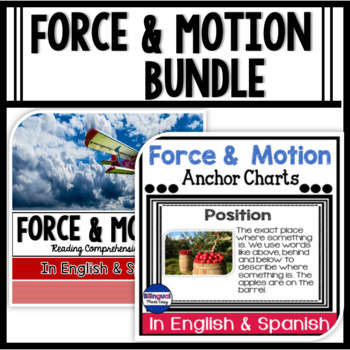3rd Grade Science Passages and Anchor Charts in English Spanish Forces & Motion
- Zip
What educators are saying
Products in this Bundle (2)
Also included in
- Spanish Español - Everything you need to teach the Third Grade Math, Reading, Writing and Science and Social Studies Common Core curriculum are included in this bundle. Save $$$ by purchasing all 65 products for one low price. Each product has materials that are in English with duplicate copies inPrice $255.00Original Price $389.29Save $134.29
- Everything you need to teach Reading, Writing, Math and Science for the Second Grade Common Core curriculum are included in this bundle. This Bundle is in English & Spanish. Every product is in English with identical copies in Spanish. Save $$$ by purchasing all 60 products for one low price.Price $250.00Original Price $320.82Save $70.82
Description
This ELA and Science product is a great way for your students to quickly practice their reading comprehension. 20 Science Anchor Charts and 5 matching reading comprehension passages are included. The Science anchor charts are a great way to teach vocabulary related to forces and motion. The high interest comprehension passages are great for homework or morning work. Each worksheet and anchor chart is in English with a duplicate copy in Spanish to fit all of your students' needs. Perfect for a Bilingual or Dual Language classroom. This product can be photocopied or can be used as a digital product.
Forces & Motion Topics:
*Force
*Motion
*Gravity
*Electricity
*Magnetism
Science Anchor Chart Poster Topics:
*Position
*Direction
*Relative
*Motion
*Predict
*Force
*Contact Forces
*Tension Forces
*Friction
*Gravity
*Magnetism
*Electricity
*Electric Charge
*Repel
*Attracts
*Conductor
*Insulator
*Static Discharge
*Magnetic Pole







